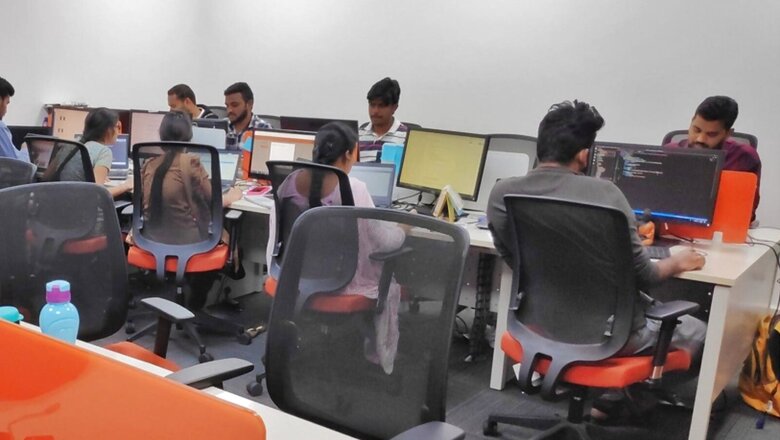
views
India is returning to normalcy after almost two years, with dipping Covid-19 cases, more vaccinations and opening up of different fronts. Along with schools, colleges and other work sectors, the IT sector, too, is gradually opening up by bringing its employees back to office — ending a months-long culture of working from home. While some employees at IT sectors have been working from office in the recent past, others are still attending work from their home towns. However, this regime is about to end for India’s largest IT services provider by revenue, Tata Consultancy Services (TCS). The company is reportedly asking its employees to come back to their “deputed location (base branch)” by November 15, which is the coming Monday, as per reports.
In a statement to the Economic Times, TCS has said that before implementing its 25/25 model for the year 2025, the company would ask its employees to return to their offices initially.
“Towards the end of CY’21, we will encourage our associates to return to offices, at least initially, before we switch to the 25/25 model. This will be done in a phased and flexible manner and will depend on respective team leaders and the requirements of each team/ project,” the statement to ET reads.
“We are committed to the 25/ 25 model, but before transitioning to the model we need to start by getting people back to office and gradually evolve to 25/25,” it adds.
In India and across the world, TCS has 5,28,748 strong workforce on its rolls. Of this, about 5 per cent employees are currently working from offices, the company said. The decision to bring others back was made via a communication from TCS executive vice president and global head of human resources Milind Lakkad.
“As employees prepare to return to office after months of working from home, organizations must transform their workplaces to create a purpose-led and adaptable enterprise. They require a comprehensive plan for safety, security and basic health needs of employees guided by empathy, engagement and empowerment,” a note on the company’s website reads. “TCS Safe Workplace ensures a smooth workplace transition by monitoring the key criteria that assure a safe and secure workplace, and productive environment. It helps minimize the complexities involved in redefining safety protocols to maintain social distancing. Equipped with an overarching deployment methodology and a strong integration layer, the solution offers end-to-end services across advisory, design, implementation and support.”
The IT giant has a plan of eventually turning to a hybrid model 25×25. Under this model company believes that by 2025, only 25 percent of its associates will need to work out of facilities at any point of time. Also, the employees will not need to spend more than 25 percent of their time at work.
Earlier this year, Lakkad, on office return has said, “With 70 per cent of TCSers (employees of TCS) fully vaccinated, and over 95 per cent having received at least one dose, we plan to gradually get our workforce back in office by the end of this year.”
TCS is not the only company that wants its employees back at their office desks.
N.R. Narayana Murthy-owned IT major Infosys also followed a similar lead while announcing the company’s quarterly earnings, and said they will follow a hybrid model going forward.
The hybrid work model, which has become popular amid the Covid-19 pandemic, is suitable for many employees after the work from home regime. The model offers a flexible location arrangement to the workers as per their fit. Under this, employees can work three days from office, and rest of it from home.
“After 18 long months, our leaders @Wipro are coming back to the office starting tomorrow (twice a week). All fully vaccinated, all ready to go – safely and socially distanced! We will watch this closely,” Rishad Premji, chairman of Wipro had said in a tweet on September 12.
IT service provider HCL Technologies has already started asking its senior employees to come to office at least twice a week, while others must attend office once a week as per requirement. “We do expect momentum to increase by the end of this calendar year. This is the policy that we have at this point of time,” Apparao VV, chief human resource officer of the company said.
Read all the Latest Business News here



















Comments
0 comment